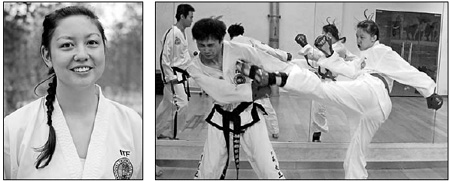Li-Lian Ahlskog-Hou screamed "aiya" when she was invited to the Democratic People's Republic of Korea (DPRK) to attend a taekwondo "get-together".
|

|
|
Beijing-based student Li-Lian Ahlskog-Hou was asked to punch above her weight in the DPRK championships. |
Only later did she realize she would be on the Chinese team at one of the world's largest taekwondo championships, though the team is not officially sanctioned by the government.
The 23-year-old Beiing-based journalism student, a taekwondo red belt, had competed many times in her home country of Sweden. But it is about a week after agreeing to participate when the penny dropped.
"My Chinese language skills are fairly basic and my coaches don't speak much English, so I didn't understand what they were asking me. Only after one evening when one of them took out his phone to translate the name of the competition for me did I actually get it.
"When I saw the words, 'world championships' appear on the screen I started screaming in the middle of the street. It was a bit of a shock."
She was on her way to the 7th International Taekwondo Federation championships, which highlights the most traditional form of the sport.
The rival World Taekwondo Federation, which held its championship in Seoul in May, has a strong emphasis on sparring. The WTF style became an Olympic sport in 2000.
Born to a Swedish mother and a Chinese father who migrated to Sweden in the 1970s, Ahlskog-Hou lived in Europe her whole life before coming to China in September 2009 to study for a master's degree in multimedia journalism.
Although she is not a Chinese citizen, Ahlskog-Hou is able to represent China because of technicalities related to how taekwondo governing bodies run competitions.
Ahlskog-Hou is the archetypal sports addict. Her home is filled with snowboards, skateboards and punching pads. Exercise is an integral part of her daily routine. She finally settled on taekwondo after trying out various martial arts in Sweden.
The Korean sport, whose name literally means the way of foot and fist, focuses on attacking through punching and kicking.
"As soon as I had settled down in Beijing I began looking for a gym to practice in, but it took me about six months before I found a suitable one. In China adults and children train together, and in many of the clubs I tried I would be the only adult.
"It's hard to train seriously when most of your opponents are under 12."
Once she found a useful club at Beijing Foreign Studies University, Ahlskog-Hou began regular training under the guidance of two coaches, themselves former world championship participants.
By her own admission, Ahlskog-Hou is really not up to international standards in taekwondo. "I know people back in Sweden who are a lot better than me," she says. "And they aren't even on the national team."
In order to raise the bar, she was put through a grueling training process, which aimed to cover in only eight weeks what an average student would learn in a year.
"I basically turned into an animal that just eats, sleeps and trains," she says. Besides daily training sessions of two to three hours, Ahlskog-Hou was ordered to run for 40 minutes every morning, do 100 sit-ups, and lose more than 3kg. This led to some drastic dietary changes.
She took to eating four extra eggs a day to increase her protein intake, allowing her to lose weight while keeping her energy levels up.
The preparations in Pyongyang for the competition that ended last week were extensive.
Officials restored the capital's "Taekwondo Palace", the world's largest taekwondo stadium and organized an accompanying taekwondo festival.
With just six girls out of a 20-plus strong team attending the competition, coaches were eager to offer Ahlskog-Hou the chance to compete, even though she is two grades below the official minimum level needed to attend the competition.
Her coach, Peng Min, says her dynamic Swedish student is something of a rarity and a welcome addition to the national squad.
"While the Chinese team is recognized for having a strong male side, the number of females at competition standard is very low," she says.
"I think many girls feel like they don't have time to train, or are worried about competing in fights and coming to work the next day with a black eye."
(China Daily September 19, 2011)